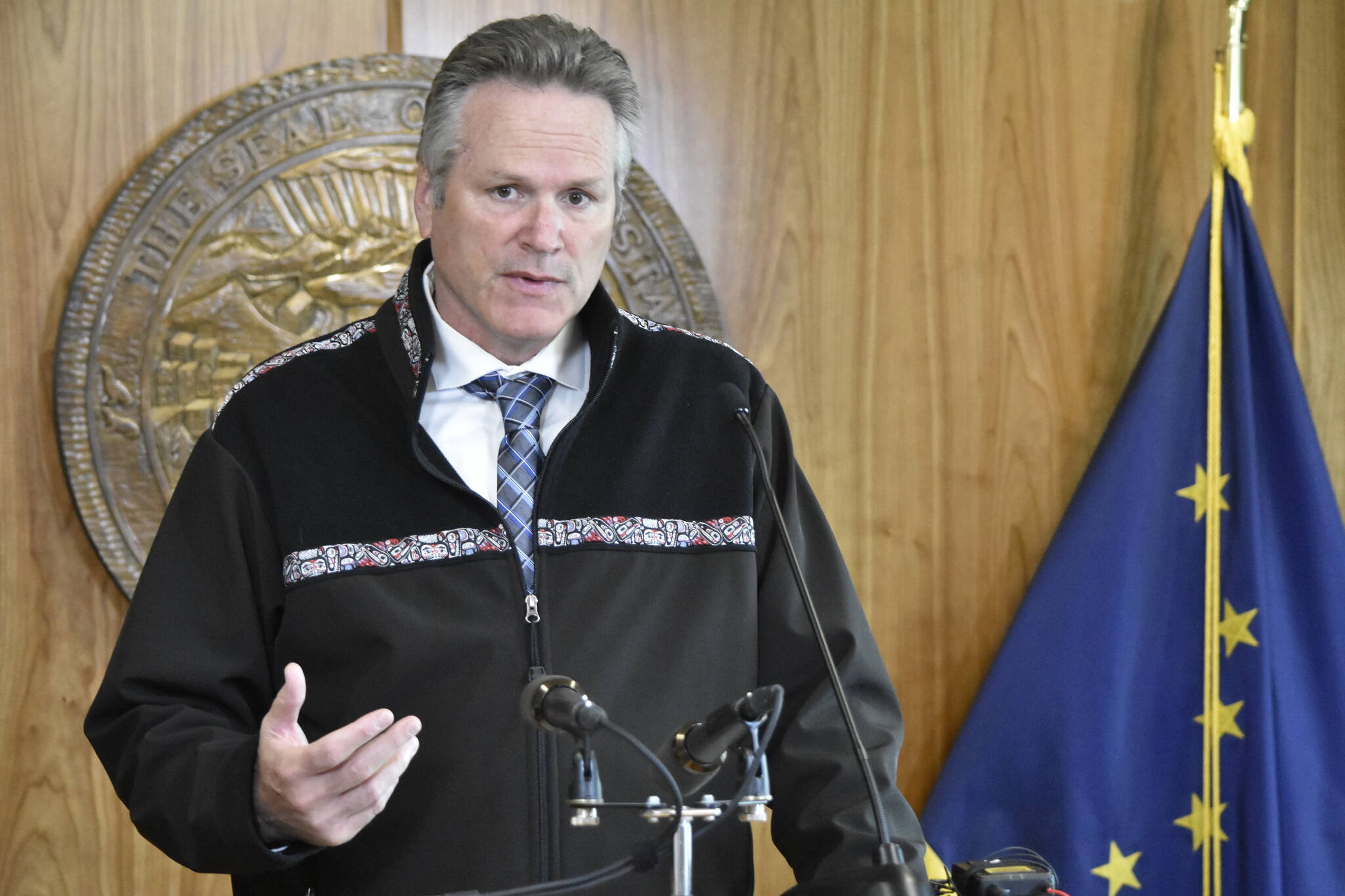Gov. Mike Dunleavy called a news conference Thursday to criticize the Biden administration following the Environmental Protection Agency’s decision to potentially establish Clean Water Act protections of certain waters in the Bristol Bay region.
Dunleavy characterized the decision as yet another attack by the Biden administration on Alaska’s ability to create wealth and opportunity.
“Since January, a number of decisions have been made that directly impact Alaska and in the opinion of many us not in a beneficial way,” Dunleavy said at a news conference in Anchorage, surrounded by representatives from the resource industry.
Limiting resource extraction in the U.S. only increases dependence on foreign entities whose environmental standards are substandard, Dunleavy said.
“What’s happening with this administration, it’s just a nonstop series of canceling projects that we believe could be done in a manner consistent with the manner that Americans will expect,” Dunleavy said.
[EPA seeks to restart process that could restrict proposed Pebble Mine]
The EPA announced Thursday it was seeking to reinitiate the process of making a Clean Water Act determination to protect certain waters in Bristol Bay.
“If such a determination is finalized, it would protect waters over the long term that are essential to commercial, subsistence and recreational fisheries and other activities that support Alaska Natives and communities in the state,” the EPA said in a news release.
Earlier in the day environmental, fisherman and Alaska Native groups lauded the decision.
“This announcement is a historic step forward in the long fight to protect Bristol Bay, our fishery, and our people,” said Robert Heyano, President of United Tribes of Bristol Bay, in a release. “The fifteen federally recognized Tribes of the UTBB who call this region home, have worked for decades to protect our pristine watershed that sustains our sacred indigenous way of life.”
In a statement, Katherine Carscallen, Commercial Fishermen of Bristol Bay executive director, said the years-long effort to protect the fisheries in the bay was back on track, and called on the EPA to complete the process.
But the governor said Alaska was compelled by its constitution to generate wealth from its resources, and that federal regulations were preventing the state from becoming financially self-sufficient. Dunleavy and industry representatives characterized the resources industry as under attack from a number of forces.
“We are facing challenges from this administration, from banks who don’t want to invest in the Arctic, from Congress, we feel like we’re being attacked in every manner,” said Kara Moriarty, Alaska Oil and Gas Association executive director.
Dunleavy said the Trump administration was friendly to Alaska’s resource industry and the new administration’s change created regulatory uncertainty for investors. However, it was the previous administration that effectively canceled the controversial Pebble Mine project at the headwaters of Bristol Bay.
The Army Corps of Engineers announced in Nov. 2020 the Pebble Project is contrary to the public interest under both the Clean Water Act and the Rivers and Harbors Act.
The governor said that his administration understood that wasn’t necessarily the end of the project.
“It was my belief that we would be able to work through the issues with the Corps,” Dunleavy said. “I was confident I could work through those issues with that project.”
Dunleavy said that despite several requests to meet with the president, he’d gotten no response from the Biden administration to discuss Alaska’s resources issues.
The Dunleavy administration has filed several lawsuits against the federal government with little success. But the governor said Thursday he believed it was necessary to push back against what he saw as government overreach.
But the debate over the Pebble Mine in particular has been controversial. In 2019, CNN released a report showing close coordination between the Dunleavy administration and the Pebble Project, the company behind the mine. CNN reported letters sent by Dunleavy to the Trump administration in support of the mine were nearly identical in language to those produced by the company itself.
In September 2020, an environmental investigative reporting group posing as investors secretly recorded conversations with Pebble Project executives, who discussed their relationship with the governor.
At Thursday’s news conference Dunleavy said resource extraction was essential to America’s future and criticized the Biden administration for making America more dependent on foreign resources.
“Make no mistake about it, this civilization is dependent on resource extraction,” Dunleavy said. This is a fight for our kids and our grandkids.”
• Contact reporter Peter Segall at psegall@juneauempire.com. Follow him on Twitter at @SegallJnuEmpire.

